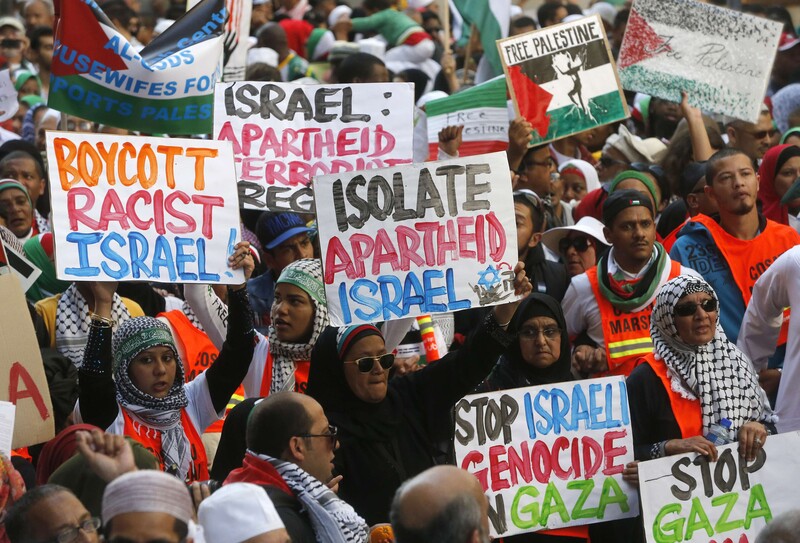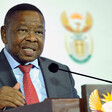The Electronic Intifada 4 August 2017

South Africans march in Cape Town against Israel’s attack on Gaza in August 2014. The movement for Palestinian rights continues to gain strength in South Africa and around the world.
ReutersSouth Africa has been described by Israeli media as the “mothership” of the boycott, divestment and sanctions (BDS) movement. While we as a country have made remarkable strides, we are only but one partner in this growing international human rights movement, a movement that proudly turned 12 this year.
In 2005, Palestinians called on the international community to support a campaign of boycott, divestment and sanctions against the government of Israel until it abides by international law.
The BDS movement, as it has come to be known, is inspired by the successful boycott of apartheid South Africa and has grown to include millions of allies globally. It has wide-reaching support in South Africa. The largest protest in South African history, after all, was the National Coalition 4 Palestine’s 2014 #SAMarch4Gaza in support of the Palestinian struggle.
BDS successes, which are registered on a monthly basis across the country and globe, motivate peace-loving peoples around the world. They are a practical form of solidarity that sends a clear and concrete message to Israel that there is a price to pay for its crimes. These victories and activities also bolster the spirit of resistance of Palestinians and their progressive Jewish Israeli allies fighting for an end to Israeli apartheid.
Electrifying pace
The BDS movement is indeed moving at an encouraging, inspiring and electrifying pace. Israel and its lobby groups are trying to respond (rather than ending Israel’s apartheid) but they are failing.
In July, in a decision with far reaching impact, the General Council of the World Communion of Reformed Churches, representing over 80 million Christians, called on its members to take action in support of the Palestinians. Among other measures, the body has urged its more than 225 member churches worldwide to examine their investment relationships.
These churches are joining a long list of Christian congregations taking similar positions and resolutions. These include the Quakers, United Methodists, the Mennonite Church of the USA, Presbyterians, the United Church of Christ, Unitarian Universalists, the Catholic Conference of Major Superiors of Men, the Alliance of Baptists, the Evangelical Lutheran Church and the United Congregational Church of Southern Africa (UCCSA).
Last year, when the UCCSA, with over 1,000 local South African churches, adopted the BDS boycott of Israel, the church, importantly, drew attention to the deceptive conflation between “Biblical Israel” and the “Modern State of Israel” and between the Israelites of the Bible and Israelis.
Beyond the churches, South Africa is also scoring major wins on the cultural, academic, sports, consumer, political and government front. One of our first major wins was in 2011 when the University of Johannesburg ended its relations with Israel’s Ben-Gurion University. This set the context for further academic boycott successes including South Africa’s largest student formation, SASCO, adopting BDS, followed by the South African Union of Students also endorsing a similar resolution.
Last year, after engagement by the local BDS South Africa chapter, several academics pulled out of a conference on genocide taking place in Israel. Among those who withdrew, much to the Israeli organizers’ irritation, was the vice president of the International Network of Genocide Scholars, who hails from South Africa.
The BDS campaign is also active within the South African cultural sector with some of the country’s biggest artists, comedians and film stars coming out to back the movement, our activities and events.
This year, award-winning South African film director John Trengove withdrew from an Israeli film festival hosted in Tel Aviv. The South African withdrawal led to several other international filmmakers also canceling their participation.
Politics and labor
Within the trade union movement, COSATU, one of the first labor federations in the world to adopt BDS, has not only incorporated BDS within its local organizing and among affiliates but has also been championing its promotion at an international level.
COSATU and its affiliates, for example, were some of the main drivers of the Public Services International adopting BDS as a strategy at the global trade union federation’s congress in Durban a few years back. PSI is one of the largest federations in the world, representing more than 20 million workers.
On the political front, South African President Jacob Zuma, for two years in a row now, has included in his 8 January speech marking the founding of the African National Congress a reminder to all employees in government that they are to boycott travel to Israel.
Furthermore, the recent recommendation by South Africa’s governing party to downgrade its embassy in Tel Aviv has been welcomed by Palestinians across the political spectrum – including the Palestinian Authority, Fatah and Hamas – and is a major signal to Israel that its violations of international law are unacceptable, that it cannot be business as usual.
Importantly, the recommendation to downgrade has also been welcomed by South African Jews for a Free Palestine, an organization representing a growing number of Jews in this country in support of BDS. The South African Communist Party, COSATU and various other organizations also came out in support of a downgrade or shutting down of the embassy.
At a government level there have been various successes. The Israeli ambassador has tried in the last few years to sign contracts between our two countries in the water sector – selling a similar colonial line that was sold to African countries by apartheid South Africa during the 1980s, that without our technology you will not progress. Likewise, Israel and its lobbyists are trying to suggest that we, as African countries, cannot do without their technology.
To Israel’s embarrassment, several events that the Israeli ambassador tried to host with the South African government were canceled. Furthermore, water minister Nomvula Mokonyane warned against Israel’s so-called water technology, saying Israel has been using water as a “tool to control the Palestinian state.”
“Israel,” she added, “is the world’s leading practitioner in water apartheid.”
Note of caution
However, some officials at South Africa’s department of international relations do not always respect the country’s policies on this issue.
Last year, for example, at the very time Speaker of Parliament Baleka Mbete was celebrating the BDS movement in her address to the annual Israeli Apartheid Week campaign, Jerry Matjila, then director general of the department of international relations, was at a photo shoot with Dore Gold, his counterpart from the Israeli foreign ministry.
Matjila claimed in contradiction with government policy, that he wanted to investigate ways in which he could improve relations with Israel.
How to hold such individuals accountable needs to be investigated especially at a time when the Israeli government has made public the huge amount of resources that are being invested in trying to thwart the BDS movement.
In some ways, the collective magnitude of our joint successes is reflected in the fact that Israel is investing time, energy and money to counter BDS. As Palestinian BDS leader Omar Barghouti put it, while activists are unnerved by the Israeli government’s attempt to attack this nonviolent movement, we are definitely not deterred.
Eyes on the prize
Palestinian academic Nada Elia, in an article celebrating 12 years of BDS, has noted how the wide array of successes, victories and campaigns over the last 12 years reveals the extent to which multiple segments of society – students, church members, unions, athletes and superstars – are now aware of and actively opposed to Israel’s abuses.
However, she cautions, no matter how much we have gained from these years of organizing, the biggest victory is still to come. And that is the day Palestinians (like us South Africans, the indigenous people of the land) are free in their homeland.
“Each victory we score – and we continue to score victories big and small almost daily – is proof that we, the people, are stronger than the most militarized powers that are intent on suppressing us,” Elia writes. “We must keep our eyes on the prize, as this is one case where the final destination, not just the empowering journey, is what matters.”
That day is coming sooner rather than later because of the Palestinian spirit of perseverance together with the advances of the BDS movement – a movement that gains its strength not from military power or financial resources but from the people.
The BDS victories, successes and wins of the last decade, both in South Africa and beyond, are not that of one organization or group of activists: they belong to the various communities who come out to protests, who stay away from certain stores, who make donations, attend rallies and events.
The ordinary person gives this extraordinary movement its internationalist muscle.
Kwara Kekana is the national spokesperson and Muhammed Desai is the national coordinator of BDS South Africa, a local South African partner of the international BDS movement which is led by the Palestinian BDS National Committee based in Ramallah. A version of this article was originally published by South Africa’s Weekend Argus newspaper.



Comments
But what about the US bill
Permalink Paranam Kid replied on
South Africa's & South Africans' support of BDS is encouraging & inspiring. Nevertheless, in the US there is the Senate Bill 720, the Anti-Israel Boycott Act under discussion, which would extend the felon to countries & companies outside the US, which, apart from its legality, is simply outrageous.
Luckily the ACLU is now involved, and already Senator Kirsten Gillibrand has courageously withdrawn her support as a result. Let's hope the ACLU is successful in scuttling that whole sick project.